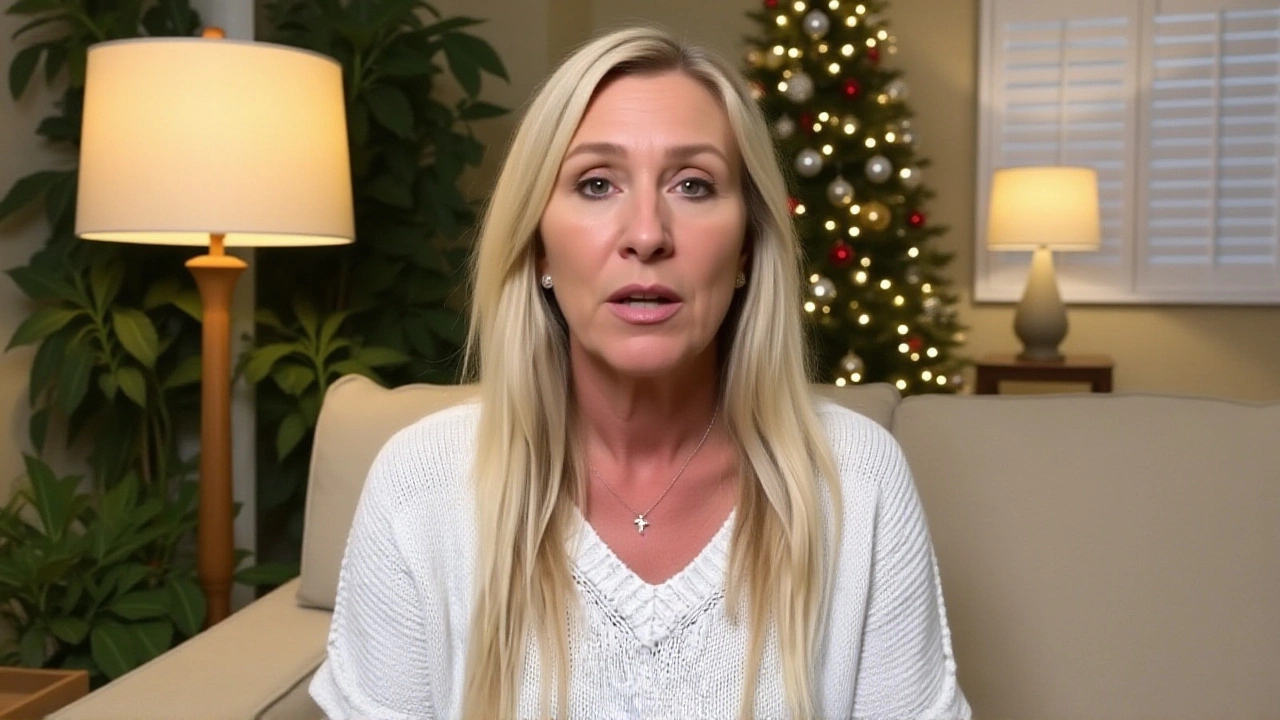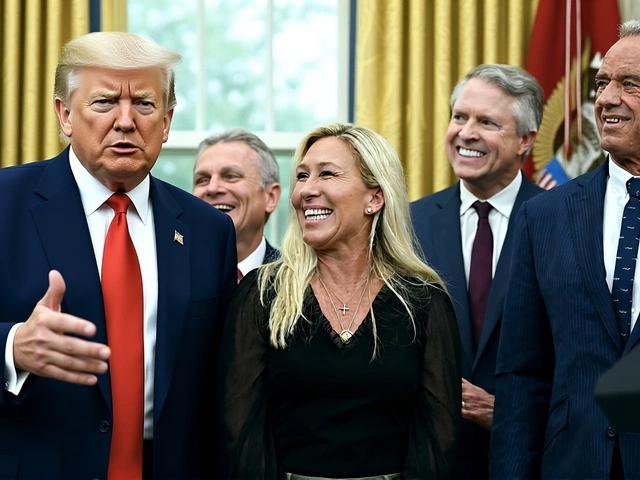Former President Donald J. Trump didn’t mince words when Marjorie Taylor Greene announced her resignation from Congress. On Saturday, November 22, 2025, Trump posted on Truth Social: "Marjorie 'Traitor' Greene... refused to return her never-ending barrage of phone calls." The remark came just hours after Greene, the fiery Republican representative from Georgia's 14th Congressional District, declared she was stepping down effective January 5, 2026 — a move that stunned even seasoned political operatives.
A Falling Out Years in the Making
Greene, elected in 2020 as one of Trump’s most loyal allies, was once his most vocal defender on the House floor. She led chants of "Lock her up!" against Hillary Clinton, pushed baseless conspiracy theories about the 2020 election, and routinely attacked Republicans who dared to break ranks. But by late 2025, the relationship had soured. Trump withdrew his endorsement on November 14, 2025 — a rare and devastating blow in the GOP. The trigger? Greene’s public criticism of Trump’s handling of Jeffrey Epstein-related documents and her opposition to certain administration policies on healthcare and foreign aid. "She started backing perhaps the worst Republican congressman in our history," Trump said, naming Thomas Massie, the libertarian-leaning Kentucky representative. "Just a stupid person. I said, ‘go your own way.’ And once I left her, she resigned because she would never have survived a primary."Greene’s Resignation: A Statement of Self-Worth
Greene’s resignation video, posted to X on November 21, 2025, was emotional but defiant. "My heart remains filled with joy," she said, "my life is filled with happiness, and my true convictions remain unchanged because my self-worth is not defined by a man, but instead by God who created everything in existence." She didn’t just blame Trump. She blamed the system. "I’ve seen too much of the Political Industrial Complex," she said. "They use Americans as pawns in an endless game of division." Her statement was laced with personal stakes: "I love my family way too much, and I do not want my sweet district to have to endure a hurtful and hateful primary against me by the president that we all fought for." It was a quiet rebellion — no screaming, no theatrics. Just a woman who’d spent five years riding the Trump wave, then decided the tide had turned too far.Trump’s Cold Response
Trump’s reaction was brutal. In his Truth Social post, he mocked her plummeting poll numbers and implied she was a coward. "She would have no chance of winning," he wrote. "I don’t think her life is in danger... frankly, I don’t think anybody cares about her." His tone was dismissive — not angry, not vengeful, just bored. That’s what made it worse for her supporters. This wasn’t a feud. It was an erasure. Political analysts noted the unprecedented nature of the split. No former president had so publicly and coldly abandoned a once-loyal ally who’d helped him dominate the GOP base. "This isn’t just a personal falling out," said Cook Political Report analyst Rachel Bovard. "It’s a signal that Trump’s control over the party’s grassroots is no longer absolute."What Happens Next in Georgia?
Greene’s resignation triggers a special election in Georgia's 14th Congressional District, which the Cook Political Report rates as "Solid R." The district, stretching from the Appalachian foothills to the outskirts of Atlanta, is overwhelmingly Republican. The winner will serve the remainder of Greene’s term, ending January 3, 2027. Georgia’s Secretary of State has 30 days to set the special election date. Expect a crowded Republican primary — at least seven candidates have already signaled interest, including a former state legislator, a retired Air Force colonel, and a far-right activist who claims Trump privately endorsed him. Democrats, long written off in this district, are running a token candidate — not to win, but to test turnout. Their strategy? Highlight Greene’s extremism and frame the race as a referendum on Trump’s influence.
Why This Matters Beyond Georgia
This isn’t just about one seat. It’s about the future of the GOP. Greene’s rise was fueled by Trump’s endorsement. Her fall was accelerated by his withdrawal. If a congresswoman who once embodied Trumpism can be discarded so casually, what does that mean for other loyalists? Will candidates now fear being too loyal — or too visible? Meanwhile, Trump’s comment about "nobody caring" about Greene speaks volumes. He’s signaling to the party: I don’t need you anymore. I have the base. I have the money. I have the platform. The real question isn’t who will win Georgia’s 14th. It’s whether Trump’s brand of politics — personal, brutal, transactional — can survive without its most loyal foot soldiers.What’s Next?
The special election in Georgia’s 14th will likely be held between March and May 2026. Meanwhile, Trump is already campaigning in Iowa and New Hampshire, but insiders say he’s quietly watching Georgia — not to help, but to see who dares to step into Greene’s shadow. Greene, for her part, has said she’ll return to Georgia and focus on "family, faith, and freedom." No book deal. No TV show. No PAC. Just silence. That silence, more than any tweet, might be the loudest statement of all.Frequently Asked Questions
Why did Marjorie Taylor Greene resign so suddenly?
Greene’s resignation wasn’t sudden — it was the culmination of a months-long rift with Donald Trump. After she publicly criticized his handling of Epstein files and backed Thomas Massie over Trump’s wishes, he withdrew his endorsement on November 14, 2025. Without his backing, her chances in a primary collapsed, and she chose to leave rather than face a bitter intra-party battle.
How unusual is it for a former president to turn on a loyal ally like this?
Extremely rare. Trump had endorsed Greene in 2020 and repeatedly defended her against bipartisan criticism. His public withdrawal of support — followed by calling her a "traitor" — marks the most public and personal rupture between a former president and a sitting congressman in modern U.S. history. Even in past GOP infighting, such direct, public humiliation was avoided.
What does Trump’s "nobody cares about her" comment reveal about his strategy?
It’s a calculated move to signal loyalty is transactional. By dismissing Greene, Trump tells other allies: Your value comes from your usefulness to me, not your loyalty. He’s consolidating power by showing he can replace anyone — even his most vocal supporters — without consequence. It’s a warning to the GOP establishment: Don’t challenge me.
Who’s likely to win the special election in Georgia’s 14th District?
The winner will almost certainly be a Republican. The Cook Political Report rates the district "Solid R," and it’s been held by Republicans since 2013. With Trump’s endorsement still influential, the candidate who can claim his tacit support — even if unspoken — will likely dominate the primary. The winner will face a nominal Democratic challenger in the general election, but the real battle is in the GOP primary.
Is this the end of Marjorie Taylor Greene’s political career?
Not necessarily. Greene has built a loyal following outside Congress, especially on social media and among conservative activists. She could reemerge as a media personality, run for state office in 2028, or even launch a PAC to back candidates aligned with her ideology. But without Trump’s backing, she won’t be a national force again — at least not in the same way.
What does this mean for Trump’s 2024 presidential campaign?
It reinforces his image as a political survivor who can purge disloyalty — a trait his base admires. But it also exposes a vulnerability: his movement is built on personal loyalty, not policy or institutions. If he wins in 2024, expect more public purges. If he loses, the GOP may fracture further as loyalists scramble to find new patrons.
